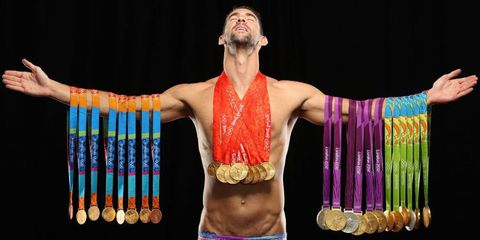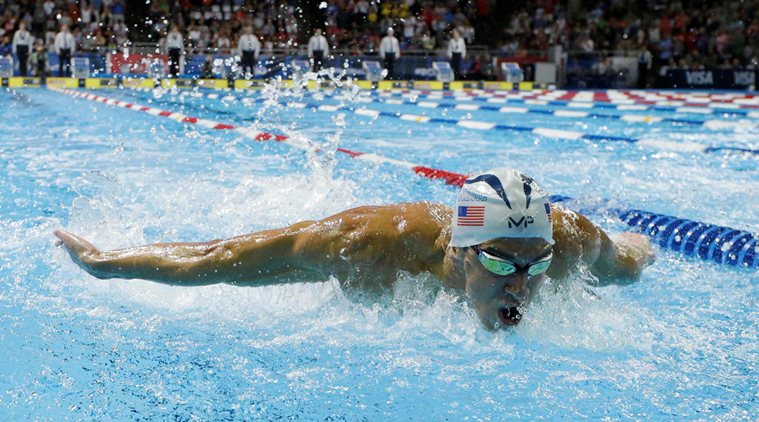"Is it possible that the best swimmer of all time, Michael Phelps, might soon lose his top platform?" - Lizette Navarro
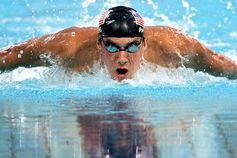
Michael Phelps is known worldwide as the most successful and most decorated retired Olympian of all time, holding the all-time records for 23 Olympic gold medals, including 13 Olympic gold medals in individual events, and 16 Olympic medals in individual events, special events for those who have previously won multiple Olympic medals at the Summer or Winter Olympic Games.
Phelps has overdone himself—setting 29 individual and 10 relay world records—accounting for more records than any other swimmer recognized by FINA. Impressed? Phelps holds 26 Guinness World Records in swimming such as: most medals, consecutive number of medals, most medals within one tournament, and most records in swimming—to name a few. Currently, Phelps holds the highest number of cumulative Guinness World Records earned by any athlete.
Realizing how superhuman one must be to attempt this level of greatness, enter Olympians Joseph Schooling, Chad Le Clos, and everyone's new—and tiny—personal favorite: Clark Kent Apuada. These men might just be super enough to catch and surpass Phelps, who is currently seen as the best swimmer to have ever lived. All of these young men have beaten Phelps during a race, or his best race time at some point in their careers. The question is will he transition to the second, third, or even fourth best within his own lifetime?
Phelps grew up in the neighborhood of Rodgers Forge, as the youngest of three children. His father, Fred, an all-around athlete, was a state trooper while his mother, Debbie, was a middle-school principal. When Phelps' parents divorced in 1994, he and his sisters lived with their mother, whom he grew very close to. Phelps’s family was well off and all kids attended good schools. Phelps’s swimming journey began with his older sister, Whitney Phelps, when she tried out for the U.S. Olympic team in 1996 at the age of 15, but injuries derailed her career—resulting in the encounternment of what will soon be his career.
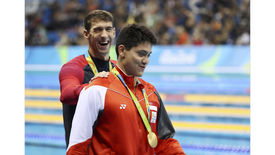
To many young swimmers, Phelps is seen as a superhero, including to Joseph Schooling, who described himself as a “major fanboy.” At the time, little did Phelps realize that one of his biggest fans would become one of his successors. At the age of 21, Schooling was able to beat his childhood superhero during a 100-meter butterfly race, giving Phelps his only silver medal from the Rio Olympics—giving Singapore and Schooling their first gold medal.
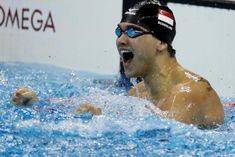
The story behind Schooling’s success shows that in order to become super, there needs to be sacrifice and passion. In hopes of giving Joseph a better chance of becoming an Olympic gold medalist, the Schooling family left their homeland of Singapore for the United States in 2009. Once reaching America, Schooling began training “stupid crazy”—starting his day at 5 am, squeezing in at least five hours of training in between hours school lessons and homework, and repeat this grueling routine six days a week.
Schooling advises young swimmers that “when you want to be the best, you’ve got to believe you’re the best”. At the start of each race, he tells himself, “I can beat everyone” and “everyone’s got to chase me down, no way [they’re] going to beat me.
Schooling advises young swimmers that “when you want to be the best, you’ve got to believe you’re the best”. At the start of each race, he tells himself, “I can beat everyone” and “everyone’s got to chase me down, no way [they’re] going to beat me.
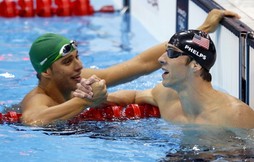
At only 25, Chad Le Clos is a multiple world champion and 2012 Olympic gold medalist. He is chasing podium finishes in all three butterfly events as the former world champion in the 50m, and the world record holder in the 100m and 200m butterfly. Le Clos shot to fame during the 2012 London Olympics by remaining head to head with Phelps in the 200m butterfly race— then, beating him by nearly 0.05 of a second, leaving the audience speechless. Le Clos had brought out the best of himself during the race, but he wants to help bring out the best sides of other swimmers too.
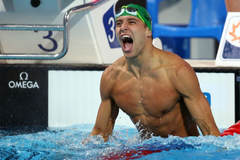
“I want to start at grassroots levels because you can’t make a champion from a big age. It is about creating a better opportunity because lots of kids get lost to the system here in South Africa. I just want to keep them going and be the best they can be," he said.
Le Clos has helped build a center known as the CLeL Academy where all swimmers are able to have a enjoyable experience in the water. Le Clos has absolute faith in his CLeC Academy coaching team, in hopes to help create the next swimming champions—while also, being personally involved in coaching when his hectic schedule allows. If a superhero can help others be the most super they can be, is he more super than Michael Phelps?
Le Clos has helped build a center known as the CLeL Academy where all swimmers are able to have a enjoyable experience in the water. Le Clos has absolute faith in his CLeC Academy coaching team, in hopes to help create the next swimming champions—while also, being personally involved in coaching when his hectic schedule allows. If a superhero can help others be the most super they can be, is he more super than Michael Phelps?
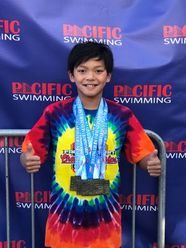
On the other hand, if you really want to get into superheroes, why not look at superman—or as most people know him--Clark Kent Apuada.
“We’re always just telling people his name is Clark. But when they realize his full name, people just call him Superman,” Clark’s mother told a reporter.
“We’re always just telling people his name is Clark. But when they realize his full name, people just call him Superman,” Clark’s mother told a reporter.
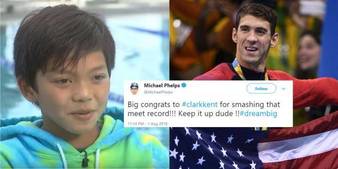
His mother is not wrong, as he is indeed living up to his name. The young, 10-year old boy swam the 100-meter butterfly in 1:09:38—one second faster than Phelps’ time, at the same event, 23 years prior. Not only was he able to beat the original superhero’s time in his best stroke (butterfly), but according to the official meet records, Apuada placed first in several championship events, including the 100-meter backstroke where his time was 1:15.79, the 50-meter backstroke completed in 33.17; the 100 meter free in 1:04.39; the 50 meter free in 29.21; and of course the 50 meter fly in 31.99.
Apuada said his next goal is set: “Paris 2024 or Los Angeles 2028. This record has motivated me to keep swimming, to keep striving and do everything I can to get to that elite level,” he was quoted as saying.
If this 10 year old is capable of breaking such a long-held record held, it begins to make not only swimmers, but everyone, wonder what else this superman is capable of.
Is it possible that the best swimmer of all time, Michael Phelps, might soon lose his top platform? Michael Phelps, Joseph Schooling, Chad Le Clos, and Clark Kent Apuada all have their own superpowers—both in and out of the water. Including Phelps, these four, have the ability to push their personal limits and break records, which isn’t something even the most experienced swimmers can accomplished within their careers. The question seems to be not if Phelps, who is now retired, will lose his throne, but when—and to whom.
If this 10 year old is capable of breaking such a long-held record held, it begins to make not only swimmers, but everyone, wonder what else this superman is capable of.
Is it possible that the best swimmer of all time, Michael Phelps, might soon lose his top platform? Michael Phelps, Joseph Schooling, Chad Le Clos, and Clark Kent Apuada all have their own superpowers—both in and out of the water. Including Phelps, these four, have the ability to push their personal limits and break records, which isn’t something even the most experienced swimmers can accomplished within their careers. The question seems to be not if Phelps, who is now retired, will lose his throne, but when—and to whom.
